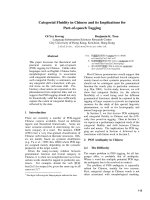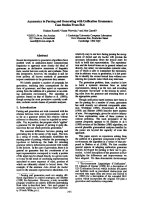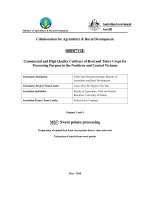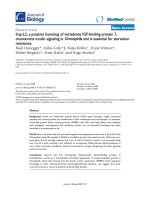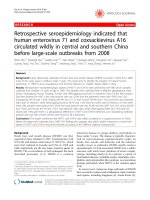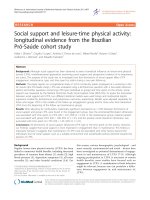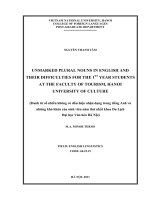Consumer social reposibility, perceived quality, trust in producer and repurchase intention for organic food: Evidence from an emerging economy / Nguyen Minh Tuan
Bạn đang xem bản rút gọn của tài liệu. Xem và tải ngay bản đầy đủ của tài liệu tại đây (654.8 KB, 19 trang )
<span class="text_page_counter">Trang 2</span><div class="page_container" data-page="2">
<b>THE 2</b>
<b><sup>nd</sup></b><b> INTERNATIONAL CONFERENCE ON ADVANCED TECHNOLOGY AND SUSTAINABLE DEVELOPMENT 2022 </b>
<b>(ICATSD 2022) </b>
<b>INTERNATIONAL SYMPOSIUM ON SUSTAINABLE DEVELOPMENT IN </b>
<b>TRANSITION ECONOMIES (ISSDTE 2022)</b>
<b>INDUSTRIAL UNIVERSITY OF HO CHI MINH CITY PUBLISHING HOUSE </b>
</div><span class="text_page_counter">Trang 3</span><div class="page_container" data-page="3"><i><small>The 2 International Conference on Advanced Technology & Sustainable Development (ICATSD 2022) </small></i>
<b>CONTENTS </b>
<b>ICATSD2F.501 ... 7 </b>
BAYESIAN MODEL AVERAGE FOR BRAND ELEMENTS ON FAST FOOD
<b>PURCHASING INTENTION IN VIETNAM’S SUSTAINABLE DEVELOPMENT </b>
BUI HUY KHOI, NGUYEN THANH LONG
<b>ICATSD2F.502 ... 19 </b>
THE ROLE OF EMPOWERING LEADERSHIP IN THE RELATIONSHIP BETWEEN
<b>LEADERSHIP TRAITS AND CREATIVITY </b>
NGUYEN THI NGAN, PHAM XUAN GIANG, LE THI KIM HOA
<b>ICATSD2F.503 ... 32 </b>
FROM MARKETING COMMUNICATION TO BRAND LOYALTY IN LOGISTICS
<b>AFTER COVID-19: CASE OF FAST DELIVERY COMPANIES IN VIETNAM </b>
NGUYEN BINH PHUONG DUY, VUONG MINH THINH, PHAM NGUYEN ANH THI, TRAN THI HUONG GIANG, CHAN THI TUYET TRAM
<b>ICATSD2F.504 ... 44 FACTORS INFLUENCING THE ONLINE PURCHASE INTENTION VIA </b>
<b>INSTAGRAM: THE EMPIRICAL STUDY IN HO CHI MINH CITY </b>
NGUYEN QUOC CUONG, LE NGUYEN, BUI HUU TUAN
<b>ICATSD2F.505 ... 58 </b>
<b>MINING AND DEVELOPMENT OF SEA TOURISM PHU YEN PROVINCE </b>
LAM THI THUY PHUONG
<b>ICATSD2F.506 ... 63 A COMPARATIVE ANALYSIS OF STOCK MARKET EFFICIENCY IN ISLAMIC AND NON-ISLAMIC COUNTRIES </b>
VU THI HONG NHUNG
<b>ICATSD2F.507 ... 77 EFFECT OF PROFITABILITY AND RISK ON MARKET POWER OF VIETNAM COMMERCIAL BANKS </b>
DUONG THI ANH TIEN, NGUYEN THI VAN, NGUYEN CONG DU, LE TRONG THAO
<b>VIETNAM </b>
LUU XUAN DANH, NGUYEN THANH LONG
<b>ICATSD2F.510 ... 115 RELATIONSHIP BETWEEN PERSONALITY CHARACTERISTICS AND RISK </b>
<b>TOLERANCE AMONG YOUNG STOCK INVESTORS IN VIETNAM </b>
DINH THI PHUONG MAI, PHAM THI NGOC HUYEN
</div><span class="text_page_counter">Trang 4</span><div class="page_container" data-page="4"><i><small>International Symposium on Sustainable Development in Transition Economies (ISSDTE 2022)</small></i>
<b>ICATSD2F.511 ... 129 </b>
<b>NETWORK MODELLING IN INTERNATIONAL TRADE OF ELECTRICAL </b>
<b>PRODUCTS: INTERRELATIONS AND EVOLUTION FEATURES FROM 2000 TO 2021 </b>
LE QUOC NHA, NGUYEN VU ANH TRAM, NINH TRAN THUY DUONG
<b>ICATSD2F.512 ... 142 MARKETIZATION OF PAYMENTS FOR FOREST ENVIRONMENTAL SERVICES (FES) IN VIETNAM - A SOLUTION FOR SUSTAINABLE ENVIRONMENTAL PROTECTION </b>
PHAM THI LINH
<b>ICATSD2F.513 ... 154 ARTIFICIAL INTELLIGENCE IN MARKETING: TOPIC MODELING </b>
THU THUY VO THI, MY DUYEN LE THI, PHUONG VIET LE-HOANG, HUONG LY NGUYEN THI
<b>ICATSD2F.514 ... 170 </b>
THE NEXUS BETWEEN OIL PRICE AND VIETNAM STOCK MARKET BEFORE
<b>AND AFTER COVID-19 OUTBREAK </b>
VU THI HONG NHUNG, PHAN THI TUYET NGAN
<b>ICATSD2F.515 ... 183 ANALYZING FACTORS AFFECTING THE ONLINE SHOPPING INTENTION </b>
<b>DURING THE COVID-19 PANDEMIC IN HO CHI MINH CITY </b>
NGUYEN THI HUONG LY, LE CONG DOAN, NGUYEN QUYNH MAI, LUNG THI KIEU OANH
<b>DURING THE COVID-19 PANDEMIC </b>
NGA PHAN THI, QUANG NGUYEN MINH, TUNG MAI SON, LOI NGUYEN TAN
<b>ICATSD2F.520 ... 245 THE IMPACT OF CONTEXTUAL FACTORS ON THE EFFECTIVENESS OF </b>
<b>INTERNAL CONTROL SYSTEM: EVIDENCE FROM ENTERPRISES IN HCMC, BINH DUONG AND DONG NAI PROVINCES </b>
THUAN PHAM QUOC, THAO MAI THI PHUONG
</div><span class="text_page_counter">Trang 5</span><div class="page_container" data-page="5"><i><small>The 2 International Conference on Advanced Technology & Sustainable Development (ICATSD 2022) </small></i>
<b>ICATSD2F.521 ... 257 TOWARDS ENHANCING THE ORGANIZATIONAL PERFORMANCE: INTERNAL AUDIT IN THE ADOPTION OF BIG DATA ANALYTICS POWERED ARTIFICIAL INTELLIGENCE FOR RISK MANAGEMENT </b>
PHAM QUANG HUY, VU KIEN PHUC
<b>ICATSD2F.522 ... 271 COVID-19 PANDEMIC AND CORPORATE CASH HOLDINGS - EFFECT OF </b>
<b>GOODWILL: EMPIRICAL EVIDENCE FROM A DEVELOPING COUNTRY </b>
NGUYEN BINH PHUONG DUY, NGUYEN BINH PHUONG THUY, NGO THI MY TIEN PHAN HUU NGHIA
<b>ICATSD2F.523 ... 286 IMPACT OF DESTINATION SOCIAL RESPONSIBILITY TO DESTINATION </b>
<b>RESILIENCE, THE CASE OF DESTINATIONS IN THE SOUTHEAST REGION, VIETNAM </b>
KHANH K N PHAM, LONG T NGUYEN, LAM T NGUYEN
<b>ICATSD2F.524 ... 297 THE IMPACT OF NET WORKING CAPITAL MANAGEMENT ON THE </b>
<b>PROFITABILITY OF LISTED ENERGY INDUSTRY COMPANIES IN VIETNAM </b>
QUOC NHAT NGUYEN, THI HAI BINH LE
<b>ICATSD2F.525 ... 311 THE EFFECT OF REVENUE DIVERSIFICATION ON BANK PROFITABILITY </b>
<b>DURING THE COVID-19 PANDEMIC: CASE OF VIETNAMESE COMMERCIAL BANKS </b>
VU CAM NHUNG, NGUYEN KIM CHI, NGUYEN THI MINH NGOC
<b>ICATSD2F.526 ... 324 EFFECTS OF INVESTOR BEHAVIOR VIA INTERNET SEARCH INTENSITY ON STOCK MARKET: EVIDENCE IN VIETNAM MARKET </b>
TRAN QUOC KHANH, NGUYEN THU HOAI, DANG THI VIET DUC, DANG PHONG NGUYEN
<b>ICATSD2F.527 ... 337 IMPACT OF NET WORKING CAPITAL MANAGEMENT ON PROFITABILITY: EVIDENCE FROM VIET NAM TELECOMMUNICATIONS SECTOR </b>
QUOC NHAT NGUYEN, THI HAI BINH LE, TAI YEN NGUYEN,QUOC HUY NGUYEN
<b>ICATSD2F.528 ... 346 FACTORS AFFECTING TURNOVER INTENTION OF EMPLOYEES AFTER THE OUTBREAK OF COVID-19 PANDEMIC, THE CASE OF EMPLOYEES WORKING IN HOSPITALITY INDUSTRY IN HO CHI MINH CITY, VIETNAM </b>
KHANH K N PHAM, THUC N NGUYEN, Y N T NGUYEN
<b>ICATSD2F.529 ... 355 THE ADOPTION OF COMBINED SWOT, ANALYTIC HIERARCHY PROCESS AND TOWS TO DETERMINE TELEHEALTH STRATEGIES DURING THE COVID-19 PANDEMIC OUTBREAK </b>
NGUYEN NGOC LONG, NGUYEN THANH HUNG, NGUYEN THI PHUONG HUYEN, VU HOANG GIANG
</div><span class="text_page_counter">Trang 6</span><div class="page_container" data-page="6"><i><small>International Symposium on Sustainable Development in Transition Economies (ISSDTE 2022)</small></i>
<b>ICATSD2F.530 ... 373 CONSUMER SOCIAL RESPONSIBILITY, PERCEIVED QUALITY, TRUST IN </b>
<b>PRODUCERS AND REPURCHASE INTENTION FOR ORGANIC FOOD: EVIDENCE FROM AN EMERGING ECONOMY </b>
NAM HAI LE, TUAN LOC LE, MINH TUAN NGUYEN
<b>ICATSD2F.531 ... 384 ASSESSING THE LEVEL OF IMPACT OF FACTORS ON THE QUALITY OF </b>
<b>ECONOMIC GROWTH OF THE SOUTHERN KEY ECONOMIC REGION </b>
PHAM NGOC KHANH
<b>ICATSD2F.532 ... 400 THE RELATIONSHIP BETWEEN SOCIAL MEDIA, CRISIS RESPONSIBILITY, </b>
<b>TRUST AND BEHAVIORAL INTENTIONS IN CRISIS COMMUNICATIONS: A STUDY AT HO CHI MINH CITY </b>
TRAN KHAI THUAN, NGUYEN VAN THANH TRUONG
<b>ICATSD2F.533 ... 415 </b>
<b>FACTORS AFFECTING THE SATISFACTION OF DOMESTIC TOURISTS WITH THE QUALITY OF OVERNIGHT CRUISE SHIP ON HA LONG BAY, QUANG NINH PROVINCE AFTER TWO WAVES OF COVID-19 PANDENMIC </b>
VU VAN VIEN, NGUYEN CONG HOAN
<b>ICATSD2F.534 ... 428 INTERACTIVE BEHAVIOR IN FACEBOOK POSTS DURING THE </b>
<b>DURATION OF COVID-19 </b>
NGUYEN VAN THANH TRUONG, DOAN THI KIM NGAN, CAO HOANG HUY
<b>ICATSD2F.535 ... 442 VALUE CO-CREATION IN HOTEL INDUSTRY: A STUDY AT HO CHI MINH CITY </b>
NGUYEN TUAN ANH, NGUYEN VAN THANH TRUONG
<b>ICATSD2F.536 ... 452 RISKS AND THEIR EFFECTS ON SERVICE-ORIENTED SUPPLY CHAIN </b>
<b>PERFORMANCE </b>
LOAN, B. T. C., THANG, T.D., UYEN, D.M., HUONG, L. T. C., HUY, T. Q., AN, D. T. B.
<b>ICATSD2F.537 ... 470 FACTORS AFFECTING INTENTION TO PURCHASE HEALTH CARE PRODUCTS ON E-COMMERCE DURING COVID-19 PANDEMIC IN HO CHI MINH CITY </b>
NGUYEN THI PHUONG GIANG, LE HUU HUNG, NGUYEN BINH PHUONG DUY
DAM TRI CUONG, NGUYEN THANH LONG
<b>ICATSD2F.540 ... 507 HAPPINESS, WELL-BEING OF STUDENTS IN SOME UNIVERSITIES IN HO CHI MINH CITY ... 507 </b>
NHU NGUYEN ANH LE, OANH THI TO PHAN
</div><span class="text_page_counter">Trang 7</span><div class="page_container" data-page="7"><i><small>The 2 International Conference on Advanced Technology & Sustainable Development (ICATSD 2022) </small></i>
<b>ICATSD2F.541 ... 519 ANALYZING THE FACTORS AFFECTING THE ONLINE SHOPPING INTENTION DURING THE COVID-19 PANDEMIC IN HO CHI MINH CITY </b>
NGUYEN THI HUONG LY, LE CONG DOAN, NGUYEN QUYNH MAI , LUNG THI KIEU OANH
<b>ICATSD2F.542 ... 530 SUPPORTING IMPACT OF INFORMATION TECHNOLOGY ON THE </b>
<b>APPLICATION OF STRATEGIC MANAGEMENT ACCOUNTING </b>
DO THI THU THAO, PHAM THI LY
<b>ICATSD2F.543 ... 537 EATING OUT: THE ISSUES OF CONCERN OF CUSTOMERS TODAY </b>
NGUYEN VAN NINH, TRUONG THI BICH NGOC
<b>ICATSD2F.544 ... 543 IMPACT OF FUNCTIONAL AND PSYCHOLOGICAL BARRIERS ON GREEN </b>
<b>CONSUMING INTENTION OF PEOPLE IN HO CHI MINH CITY </b>
PHAM XUAN GIANG, BUI HUY KHOI, BAO TRUNG
<b>ICATSD2F.545 ... 553 TRENDS TO CONVERT TRADITIONAL ACCOUNTING TO CURRENT 4.0 </b>
<b>ACCOUNTING TECHNOLOGY </b>
VAN-ANH THI HO, THUY THANH THI TANG, TU-ANH PHAM, HUONG QUYNH THI TRAN
<b>ICATSD2F.546 ... 564 THE FACTORS AFFECTING THE APPLICATION OF MANAGEMENT </b>
<b>ACCOUNTING TECHNIQUES AND ITS IMPACT ON BUSINESS PERFORMANCE IN VIETNAMESE ENTERPRISES </b>
HOAN THU THI NGUYEN, HANH THUY THI NGUYEN, PHUONG HOANG LE, HUONG QUYNH THI TRAN,BICH NGOC THI NGUYEN, HAI NGOC THI NGUYEN
<b>ICATSD2F.547 ... 577 THE FACTORS DETERMINING CORPORATE SOCIAL RESPONSIBILITY </b>
<b>DISCLOSURE - THE CASE OF FOOD PROCESSING ENTERPRISES IN VIETNAM </b>
<b>NGUYEN THI KIM TUYEN, NGUYEN THI MAI HUONG </b>
<b>ICATSD2F.548 ... 594 FACTORS AFFECTING THE ORGANIZATION IN ACCOUNTING OF SMALL AND MEDIUM ENTERPRISES - CASE STUDY IN HO CHI MINH CITY, VIETNAM </b>
<b>HUỲNH TẤN DŨNG, LÊ THỊ HỒNG THOA </b>
<b>ICATSD2F.549 ... 606 EVALUATING OF DESTINATION COMPETITIVENESS OF HO CHI MINH CITY IN THE NEW NORMAL STAGE TO DEVELOP SUSTAINABLE TOURISM </b>
TA TUONG VI, NGUYEN ANH LOI
<b>ICATSD2F.550 ... 614 EMBEDDING SUSTAINABILITY CONSIDERATIONS INTO BUSINESS PRACTICE THROUGH ACCOUNTING FOR SUSTAINABILITY </b>
BUI THI TRUC QUY, NGUYEN TRAN THUY TIEN
<b> </b>
</div><span class="text_page_counter">Trang 8</span><div class="page_container" data-page="8"><i><small>The 2 International Conference on Advanced Technology & Sustainable Development (ICATSD 2022) </small></i>
<b>ICATSD2F.530 </b>
<b>CONSUMER SOCIAL RESPONSIBILITY, PERCEIVED QUALITY, TRUST IN PRODUCERS AND REPURCHASE INTENTION FOR ORGANIC FOOD: </b>
<b>EVIDENCE FROM AN EMERGING ECONOMY </b>
NAM HAI LE<small>1</small>, TUAN LOC LE<small>2</small>, MINH TUAN NGUYEN<small>3 </small>
<i>Ho Chi Minh University of Banking </i>
<i>, , </i>
<b>Abstract.</b>
<b> Consumers, especially in emerging economies, are increasingly interested in sustainable </b>consumption, as well as environmentally friendly products and services right from production to consumption. This study investigates the relationship of four constructs, namely consumer social responsibility (CnSR), perceived quality (PQ), trust in producers (TRP), and repurchase intention (RPI) when consuming organic food. A combination of qualitative research and quantitative research (survey) was used to gain the research objectives. The data quantitative was collected from a sample of 494 organic food consumers in an emerging market economy, i.e., Vietnam. Partial least squares structural equation modeling (PLS-SEM) was applied to analyze and test suggested hypotheses in the research model. The finding indicates that consumer social responsibility has a positive effect on perceived quality, trust in producers, and repurchase intention. Moreover, perceived quality and trust in producers also significantly impact repurchase intention. The result also suggests important implications for organic food producers and marketers to increase the consumption of this food in Viet Nam.
<b>Keywords.</b>
consumer social responsibility, organic food, repurchase intention, trust in producers.<b>1 INTRODUCTION </b>
The trend of organic food consumption and this food’s interest are increasing in many different countries around the world. The value of the global organic food and beverage market reaches $188.35 billion (Grand View Research, 2022a). Forecasted revenue reaches USD 564.22 billion by 2030 (Grand View Research, 2022b). Previous studies related to organic food consumption behavior have been conducted in both developed and developing countries, such as in Turkey (Demirtas, 2019), in USA (Shin et al., 2019), in France (Ladwein & Sánchez Romero, 2021), in Romani (Fleseriu et al., 2020), in Turkey, Pakistan, Iran (Asif et al., 2018), in India (Nagaraj, 2021; Tandon et al., 2020), in Tanzania and Kenya (Wang et al., 2019) and in Viet Nam (Le-Anh & Nguyen-To, 2020; Pham et al., 2018). Most of these studies focus on purchase intention or willingness to buy. In contrast, there is little study on repurchase intention toward organic food in Viet Nam - emerging market economy.
Furthermore, consumers are paying more and more attention to their food choices because of sustainability (De Canio & Martinelli, 2021). Organic food is known as high-quality food, eco-friendly food because of its outstanding attributes, such as lack of preservatives, free of artificial chemicals, antibiotics, and hormones (Misra & Singh, 2016; Paul & Rana, 2012; Rana & Paul, 2017). So, when consumers buy organic food or re-buying, they tend to show their responsibility for environmental impact known as consumer social responsibility (Quazi et al., 2016). There is also a strong link between Consumer social responsibility (CnSR) and corporate social responsibility (CSR) (Gómez-Corona, 2020; Vitell, 2015). And the environmental aspect of social responsibility is often overlooked (Rashid et al., 2014).
In addition, the role of trust in the organic food purchasing process is demonstrated in previous publications. Accordingly, trust relates to willingness to pay for this food (Da Cunha et al., 2019; Konuk, 2020; Tung et al., 2012); trust has a positive relationship with purchase intention (Konuk, 2018). However, all the mentioned research has focused on product characteristics and performance. Few studies focus on
</div><span class="text_page_counter">Trang 9</span><div class="page_container" data-page="9"><i><small>International Symposium on Sustainable Development in Transition Economies (ISSDTE 2022)</small></i>
stakeholder trust such as trust toward organic milk producers in Italy (Carfora et al., 2019). In Viet Nam, the role of trust in the producers in the organic food supply chain is also not fully provided. Hamzaoui-Essoussi et al. (2013) also suggest that it is essential to take into account different market structures, trust, as well as different food cultures. Hence, it is crucial to study the effect of trust in organic food producers on repurchase intention, especially in emerging market as Viet Nam.
So, the following research objectives are formulated:
RO1. Examining the effect of consumer social responsibility on perceived quality, trust in producers, and repurchase intention for organic food.
RO2. Examining the impact of perceived quality on repurchase intention for organic food. RO3. Examining the influence of trust in producers on repurchase intention for organic food. RO4. Providing recommendations to increase repurchase intention for organic food.
<b>2 LITERATURE REVIEW </b>
Based on the theory of planned behavior (Ajzen, 1991) along with the cue utilization theory proposed by Olson (1972), and the Commitment-Trust theory of Morgan & Hunt (1994), this study examines the relationship of four constructs, including consumer social responsibility (CnSR), perceived quality (PQ), trust in producers (TRP), and Repurchase intention (RPI). These relationships are discussed as follows:
<i><b>Consumer social responsibility (CnSR) and its relationship with perceived quality (PQ), Trust in producers (TRP), and Repurchase intention (RPI) </b></i>
In the study of Muncy & Vitell (1992), consumer social responsibility (CnSR) is understood as “the moral principles and standards” regarding the possession, use, and disposal of products by individuals. Similarly, Devinney et al. (2006) consider consumer social responsibility as “the conscious and deliberate choice to make certain consumption choices based on personal and moral beliefs”. Webster Jr (1975) focuses on the “social aspect” when referring to consumers' consciousness in considering the impact of selected products. Whereas several definitions of consumer social responsibility deal with the “environmental aspect” indicated in previous publications such as Antil (1984), Fisk (1973), and Straughan & Roberts (1999). Quazi et al. (2016) refer to the choice of ‘‘the right things to do’’ toward the individual’s stakeholders as an important attribute of consumer social responsibility. In summary, consumer social responsibility demonstrates their consciousness when choosing eco-friendly products. (Schlaile et al., 2018).
Organic food has produced with organic agricultural practices. That means chemical fertilizers, pesticides, or toxic preservatives are not used in the production process (Paul & Rana, 2012; Rana & Paul, 2017). So, organic food is rated healthier than other conventional foods (Williams & Hammitt, 2001). At the same time, consumption of organic food is understood as responsible consumption behaviors because it is friendly to the environment (Yadav et al., 2019; Yadav & Pathak, 2016). From the above discussion, this study focuses on the environmental impact aspect of consumer social responsibility when carried out. The more environmentally conscious or consumption-conscious consumers are, the more high-quality foods they are interested in such as organic foods. The role of social responsibility of consumers has been tested in green purchase behavior (Rejikumar, 2016) and organic food purchase behavior (Singh & Alok, 2021). Moreover, consumer social responsibility has a strong relationship with repurchase behavior.
Based on these discussions, the following hypotheses are proposed:
H1: Consumer social responsibility has a positive impact on perceived quality for organic food. H2: Consumer social responsibility has a positive impact on trust in organic producers.
H3: Consumer social responsibility has a positive impact on repurchase intention for organic food.
<i><b>Perceived quality (PQ) and Repurchase intention (RPI) </b></i>
Perceived quality is defined as “the consumer's judgment about a product's overall excellence or superiority” (Zeithaml, 1988). Based on the cue utilization theory proposed by Olson (1972), Richardson et al. (1994) indicate that products consist of an array of cues, namely extrinsic cues, and intrinsic cues. Consumers use them to evaluate the product quality. Relating to organic food consumption, intrinsic cues refer to the physical properties of the product such as taste, smell, and freshness. Whereas price and packaging are known to be external attributes of the product. In this research, perceived quality is one of the cues evaluated by consumers when purchasing. Furthermore, the influence of perceived quality on repurchase intention has also been demonstrated (De Toni et al., 2018; Ting et al., 2018). Hence, the following hypothesis is suggested:
</div><span class="text_page_counter">Trang 10</span><div class="page_container" data-page="10"><i><small>The 2 International Conference on Advanced Technology & Sustainable Development (ICATSD 2022) </small></i>
<b>H4: Perceived quality has a positive impact on repurchase intention for organic food. </b>
<i><b>Trust in producers (TRP) and Repurchase intention (RPI) </b></i>
In the Commitment-Trust theory, trust is established when one party believes that the partner has reliability and integrity (Morgan & Hunt, 1994). Regarding organic food consumption, trust refers to customers' confidence in the properties of food, or their confidence in stakeholders, such as producers, retailers, farmers, or other organizations. In the previous researches, the role of trust has been proved such as trust in retailers (Khare & Pandey, 2017; Pandey & Khare, 2017; Steffen & Doppler, 2018), trust in organic food (Konuk, 2018), and trust in organic production (Da Cunha et al., 2019). In the food field, consumers trust can be built in a variety of ways. Accordingly, trust is formed from the relationship between the parties not only in the food production process but also in the distribution process (Zhang et al., 2016). With the diversified development of sales channels, direct sales are also chosen by producers. Therefore, increasing trust as well as strengthening relationships between producers and customers is very necessary to promote the consumption of organic food. At the same time, Hamzaoui-Essoussi et al. (2013) indicates that “trust is a determinant of consumers' choices, not only of the type of organic product but also of the type of distribution channel”. Therefore, hypothesis H5 is proposed in this study:
H5: Trust in producers has a positive impact on repurchase intention for organic food. The research model is proposed as follows (Figure 1)
<small>Figure 1. The proposed research model </small>
<b>3 METHODOLOGY AND DATA 3.1 Research method </b>
To gain those set-out research objectives, the study mixed qualitative and quantitative approaches (Johnson et al., 2007). This combination is also known as the mixed method. Using mixed methods research is considered an efficient way to harness strengths that offset the weaknesses of both quantitative and qualitative research (Creswell & Clark, 2017). In particular, to adjust and clarify the statements, six candidates were selected for focus group discussion. All of the participants had experience in organic food consumption for at least one year. The results of the qualitative research step showed that 22 items of official scales were established. Next, a self-Administered Questionnaire was designed to collect quantitative data. Through snowball sampling, data from 494 people who had experience consuming organic food were used to analyze.
<b>3.2 Measure </b>
The items of each variable were adjusted based on the previous studies and the actual situation of this study through qualitative research. All of them were evaluated via a 5-point Likert scale. Firstly, consumer social responsibility was measured using a five-item scale adopted from the study of Quazi et al. (2016). Secondly, the trust in producers was measured using a seven-item scale adjusted from the study of De Jonge et al. (2007), Ladwein & Sánchez Romero (2021) and focus group discussion. Exploring perceived quality with five items adopted from De Toni et al. (2018). Finally, the repurchase intention was formed with five items from the previous studies of Mittal et al. (1998); Wu et al. (2014) and focus group discussion.
</div>